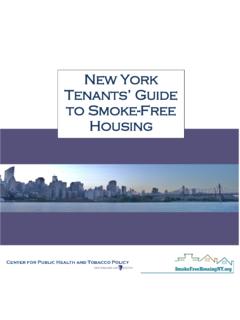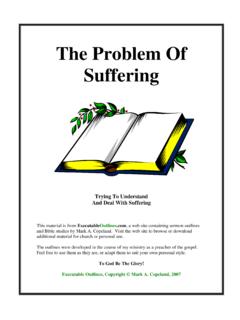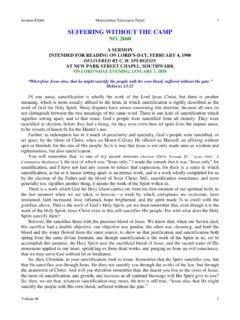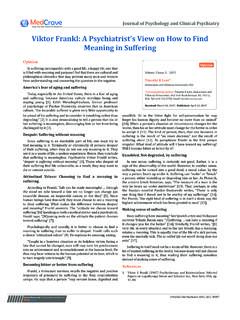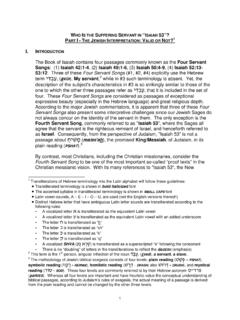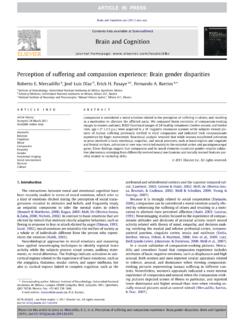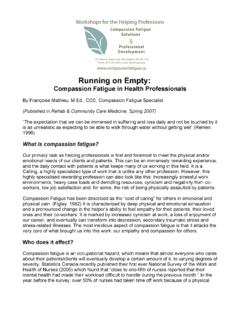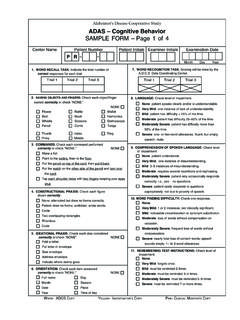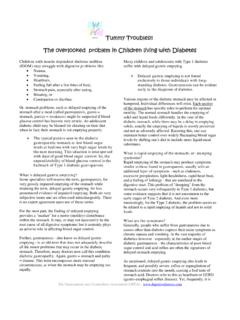Transcription of Options for Condo Owners Suffering from Drifting ...
1 Illustrations by Janet Cleland California Department of Public HealthOption #2 Use the nuisance provision in the CC&Rs Nearly all CC&Rs3 contain a provision saying that certain conditions or activities will be considered a nuisance and not permitted by the homeowners association (HOA.) Some CC&Rs nuisance provisions list specific examples, such as loud noise at certain hours or foul odors, while others merely make a general statement that any activity or thing affecting residents health or welfare will not be permitted. If secondhand smoke is Drifting into your unit and your neighbor won t agree to work out an informal solution, you may ask the HOA to enforce the nuisance provision against the neighbor. You If you own a condo1 and a neighbor s secondhand smoke is entering your unit, you may be concerned about the implications for your health.
2 Breathing secondhand smoke can be dangerous,2 and when it enters your home, it becomes difficult to escape. This fact sheet outlines six Options for Condo Owners who want to avoid unwanted exposure to secondhand smoke at home. It focuses on Options for those whose complex is not quite ready to restrict smoking on the property. If you are renting a Condo , there are Options available to your unit s owner , along with some steps you can take. If you rent an apartment, see TALC s other fact sheets on smokefree rental housing at #1 Work out a solution with your neighborBefore you take any other action, it is often best to try and reach an agreement with your smoking neighbor. The neighbor could agree to limit where s/he smokes, for example, or the times when s/he smokes. This type of agreement is not legally binding but may solve the you could work out an agreement informally on your own, there are mediation and dispute resolution programs that can be helpful for disputes like this.
3 Nolo ( ) has free information on mediation that explains what it is and how it works (select Search Entire Site from the drop-down menu and search for the term Mediation FAQ ). TALC has a listing of alternative dispute resolution services categorized by county, available at for Condo Owners Suffering from Drifting Secondhand SmokeJune 2009 The most effective way to eliminate secondhand smoke in your Condo complex is to prohibit smoking on the premises. If you d like to work with your homeowners association (HOA) to limit smoking, please see TALC s fact sheet How to Make a Condo Complex Smokefree, available at (510) 302-33802If your neighbor ignores the board s initial warning, it may require the smoking owner to appear at a board hearing and impose a fine or suspend privileges for each nuisance violation.
4 If the fines do not solve the problem, the HOA can seek a court order to stop the owner from creating a #3 Sue the HOAThe HOA may not agree that the amount of secondhand smoke in your apartment violates the nuisance provision and decline to get involved, or it may make only a token effort to enforce the nuisance provision. If you believe your HOA has failed to fulfill its duty to enforce any part of the CC&Rs, including the nuisance provision, you can take the HOA to court to compel it to do A Condo owner in Massachusetts recently filed suit against her HOA after she formally requested that they act because Drifting secondhand smoke was causing a hazardous condition in her unit, and the HOA did nothing to stop The HOA asked the court to dismiss the suit, but the court Option #4 Sue the neighborIf going to the board doesn t solve the prob-lem, another option is to bring a lawsuit against the neighbor who allows the secondhand smoke to drift into your unit.
5 (Even if the smoker is a guest or tenant, the lawsuit must be brought against the Condo owner , because, in a Condo , own-ers are responsible for ensuring that guests and tenants follow all HOA rules and restrictions.) You should only consider a lawsuit against your neigh-bor after you have exhausted all other should submit your request in writing and keep a copy for yourself. Because the Drifting smoke may violate the nuisance provision of the CC&Rs, the Condo board of directors ( board )4 has a duty to investigate the complaint and make a good faith determination of whether or not the secondhand smoke constitutes a To be deemed a nuisance, the secondhand smoke must cause an unreasonable disturbance to your use of your property. When making your request to the HOA, you must follow the procedures set out by your complex s governing If the board members agree with you that the Drifting secondhand smoke is substantial enough to constitute a nuisance, they must take appropriate action to stop the nuisance.
6 A simple phone call or warning letter from the board may cure the problem. It is important to note that the person making the complaint cannot dictate how to resolve the nuisance; the smoking neighbor, in conjunction with the HOA, will make that decision. The HOA doesn t have the power to order anyone to quit smoking altogether. But it might, for instance, be able to limit smoking to outdoors and away from the building or only indoors at certain times of day when the neighbors are not home; or it could require the unit be altered by sealing the air gaps or installing a HEPA Filing a lawsuit should be your last resort. Lawsuits are time consuming, expensive, and contentious, and the outcome is always In addition, some CC&Rs contain an attorneys fees provision. If a homeowner sues the HOA and loses whether in superior court or small claims court this provision would allow the HOA to charge that homeowner for the costs the HOA incurred defending itself against the lawsuit.
7 Before suing you should consult an attorney to learn whether your CC&Rs contain such a you decide to proceed with a lawsuit against your neighbor, you might base it on one or more of the following grounds, depending on your situation:Violating the CC&RsAll Owners agree to abide by the restrictions contained in the CC&Rs when they purchase a Condo . In essence, because CC&Rs include a clause that Owners will not create a nuisance, your lawsuit would claim the neighbor broke this contract by permitting secondhand smoke to enter your NuisanceSome California cities have a law expressly stating that Drifting secondhand smoke constitutes a If there is no such law in your city, you must rely on state law, which does not identify secondhand smoke as a To win in court under California law, you would have to show that the secondhand smoke Drifting into your apartment amounts to a substantial and unreasonable interference with the use and enjoyment of your possible causes of action in a lawsuit against your neighbor include trespass, negligence, harass-ment, battery, or intentional infliction of emotional distress.
8 Each of these legal claims is explained in the glossary of the TALC publication Legal Options for Tenants Suffering from Secondhand Smoke, available at If you decide to sue your neighbor, you ll need to decide whether to go to regular court or small claims court a decision that depends on what you want to get out of your lawsuit and whether you can hire an attorney. There are pros and cons to using each claims courtIn small claims court, neither side is allowed to have attorneys, so you would represent yourself, which would save you money. Although small claims court can t directly order anyone to stop smoking inside the unit, it does have an option called a conditional judgment, which allows a losing defendant to choose between paying a fine or taking an action. For example, you could ask the judge to issue an order that says the smoker either has to pay you a certain amount of money or stop smoking in the unit.
9 If the smoker chooses to pay the money, however, small claims court is unable to prevent him or her from continuing to smoke in the claims court does have the power to order the neighbor to reimburse you for any money you ve spent or lost due to the smoking, known as damages for instance, out-of-pocket expenses for items such as air filters or medical costs, or lost income if you missed work because the smoke made you sick. (In small claims court, the maximum amount of a claim is $7,500.) To learn more about bringing a suit in small claims court, a booklet from the California Department of Consumer Affairs is a great resource ( ), as well as the information at the California Courts website ( ). Superior CourtIf you file your case in Superior Court, you may ask the court to issue an injunction an order to stop doing something, in this case smoking and you also can seek money damages if you wish.
10 If you decide to go this route, you ll probably need to hire a lawyer, which can become expensive. TALC s California Legal & Dispute Resolution Services for Tenants & Smokers Injured by Tobacco (available at ) includes a listing of lawyer referral services in each #5 Make a reasonable accommodation requestCalifornia and federal disability laws have a process for requesting a reasonable accommodation to ensure that people with disabilities have an equal opportunity to access and enjoy their To qualify for protection under these laws, you must have a medical condition that meets the legal definition of a disability a mental or physical condition that limits (under California law20) or substantially limits (under federal law21) a major life activity such as breathing, walking, or performing manual tasks.
